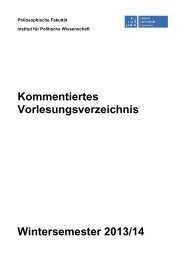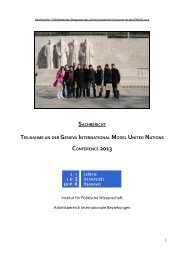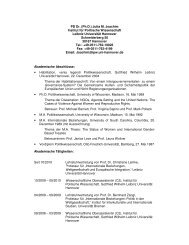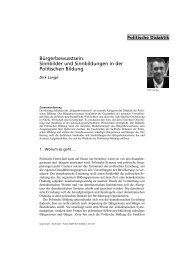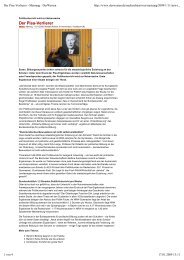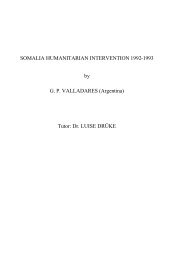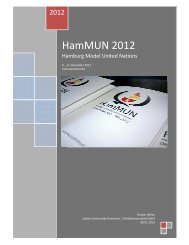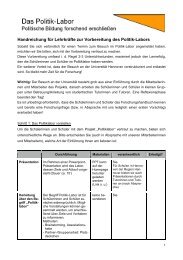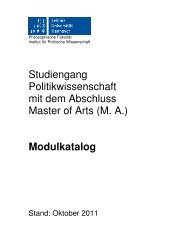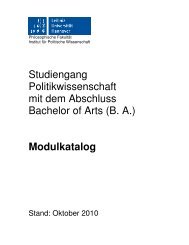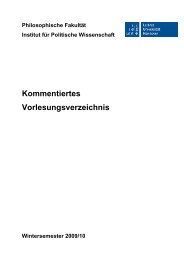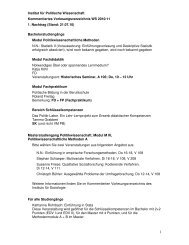Preventive Action for Refugee Producing Situations
Preventive Action for Refugee Producing Situations
Preventive Action for Refugee Producing Situations
Create successful ePaper yourself
Turn your PDF publications into a flip-book with our unique Google optimized e-Paper software.
198 Chapter 5<br />
52. Definition of proposed international preventive action<br />
In order to establish that states objections against our proposal are justified we<br />
will first examine principles of intervention or humanitarian intervention to<br />
show that there need not be a clash between the proposed preventive action and<br />
intervention.<br />
5.2.1. Meaning of intervention, and of humanitarian intervention a)<br />
Intervention<br />
What, exactly, constitutes intervention? Lauterpacht established the classical<br />
legal definition of intervention in his International Law and Human Rights:<br />
Intervention is a technical term of, on the whole, unequivocal connotation. It signifies<br />
dictatorial interference in the sense of action amounting to a denial of the<br />
independence of the State. It implies a peremptory demand <strong>for</strong> positive conduct or<br />
abstention - a demand which, if not complied with, involves a threat of or recourse to<br />
compulsion, though not necessarily physical compulsion, in some <strong>for</strong>m. 459<br />
This definition is now considered too restrictive by many political scientists<br />
and practitioners who have suggested much broader grounds <strong>for</strong> intervention.<br />
George Modelski, <strong>for</strong> example, notes that the influence of intervening powers<br />
is readily perceived, but further asserts that strict impartiality on the part of<br />
noninvolved third parties is equally important, partly because neutrality cannot<br />
be legitimately expressed by simple noninvolvement:<br />
459 Lauterpacht points out the concurrence of scholarly opinion in the definition of<br />
the term: "Oppenheim describes intervention as 'dictatorial interference by a State<br />
in the affairs of another State,' and emphasized that 'intervention proper is always<br />
dictatorial interference, not interference pure and simple'. Prof. Verdross speaks<br />
of intervention as taking place when a State threatens another with evil if the latter<br />
refuses to yield in a manner which international law leaves to its exclusive jurisdiction.<br />
Professor Stowell, in the leading monograph on intervention, refers to it<br />
throughout as aiming at en<strong>for</strong>cement There are few topics in international law in<br />
which the uni<strong>for</strong>mity of definition is so impressive and instructive. In order to<br />
justify the use of the term 'intervention' in its accepted scientific connotation there<br />
must be an attempt 'to impose the will' of one or more States upon another State in<br />
an 'imperative <strong>for</strong>m." As quoted by Laurie Sheila Wiseberg, "The International<br />
Politics of Relief: A Case Study of the Relief Operations Mounted During the Nigerian<br />
Civil War (1967-1970)," diss. University of Cali<strong>for</strong>nia, Los Angeles, 1973,<br />
p. 481.<br />
Legal Justification 199<br />
The alternative of nonactivity or nonintervention does not exist because inactivity or<br />
nonintervention must be interpreted as encouragement of the stronger party in internal<br />
war. (Emphasis in the original) 460<br />
Modelski not only criticizes the bystander <strong>for</strong> remaining silent but also holds<br />
him partly guilty <strong>for</strong> the crime committed. 461 The principle of nonintervention,<br />
however, serves an important purpose in protecting smaller nations from being<br />
arbitrarily invaded by larger powers. Recognizing some fundamental advantages<br />
to nonintervention, the drafters of the UN Charter included Art. 2(7):<br />
Nothing contained in the present Charter shall authorize the United Nations to intervene<br />
in matters which are essentially within the domestic jurisdiction of any state462<br />
Even though he was a representative of the sponsoring power, then U.S.<br />
Secretary of State John F. Dulles urged that the principle of "domestic jurisdiction"<br />
should be interpreted as a political principle, "allowing it to evolve as<br />
the state of the world, the public opinion of the world, and the factual<br />
interdependence of the world makes it necessary and appropriate that it should<br />
evolve." 463 Dulles' words probably signify that, as early as in 1945, the<br />
increasing interdependence developing among the nations in the years to come<br />
inevitably meant a gradual decrease of domestic jurisdiction.<br />
_________________________<br />
460 See Laurie Sheila Wiseberg, p. 482.<br />
461 This, at times, is an accusation made against UN officials (of the UNDP, UNHCR<br />
and other UN organizations) who are serving in countries where the most cruel<br />
atrocities are being committed by governmental, para-governmental, or antigovernmental<br />
<strong>for</strong>ces, without being able due to their restricted mandate to take any<br />
action albeit their motivation. The risk is the choice between being declared<br />
'persona non grata' (considered by many committed international workers to be a<br />
compliment <strong>for</strong> having done a good job against oppressive regimes) or staying inside<br />
the country and trying to do what is possible to relieve the suffering.<br />
462 The principle of nonintervention can be found in many international instruments,<br />
including in the League of Nations Charter 15(8); the pact of the Ligue Arabe of 22<br />
March 1945, the OAS Charter of Bogota, 30 April 1948, the Warshaw Pact Art.8,4<br />
May 1955; the OAU Charter of 25 May 1963, GA Res 2131, (XX), 21 Dec. 1965,<br />
GA Res 2625 (XXV), 24 Oct. 1970, and the Final Act of Helsinki (v), 1 Aug. 1975.<br />
Helmut Rumpf, Der Internationale Schutz der Menschenrechte und das<br />
Interventionsverbot, pp. 14-15.<br />
463 Rajan.p. 229.



